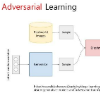We propose and assess an alternative quantum generator architecture in the context of generative adversarial learning for Monte Carlo event generation, used to simulate particle physics processes at the Large Hadron Collider (LHC). We validate this methodology by implementing the quantum network on artificial data generated from known underlying distributions. The network is then applied to Monte Carlo-generated datasets of specific LHC scattering processes. The new quantum generator architecture leads to an improvement in state-of-the-art implementations while maintaining shallow-depth networks. Moreover, the quantum generator successfully learns the underlying distribution functions even if trained with small training sample sets; this is particularly interesting for data augmentation applications. We deploy this novel methodology on two different quantum hardware architectures, trapped-ion and superconducting technologies, to test its hardware-independent viability.
翻译:在蒙特卡洛事件生成的基因对抗性学习背景下,我们提出和评估替代量子发电机结构,用于模拟大型高原相撞器(LHC)的粒子物理学过程。我们通过实施已知基本分布法产生的人工数据量子网络来验证这一方法。然后,这个网络应用于蒙特卡洛产生的特定LHC散射过程的数据集。新的量子发电机结构改进了最先进的实施,同时保持浅深度网络。此外,量子生成器成功地学习了基本分布功能,即使受过小规模培训的样本培训;这对数据增强应用特别有意思。我们将这一新方法应用于两种不同的量子硬件结构,即锁定和超导导技术,以测试其硬件独立的可行性。




